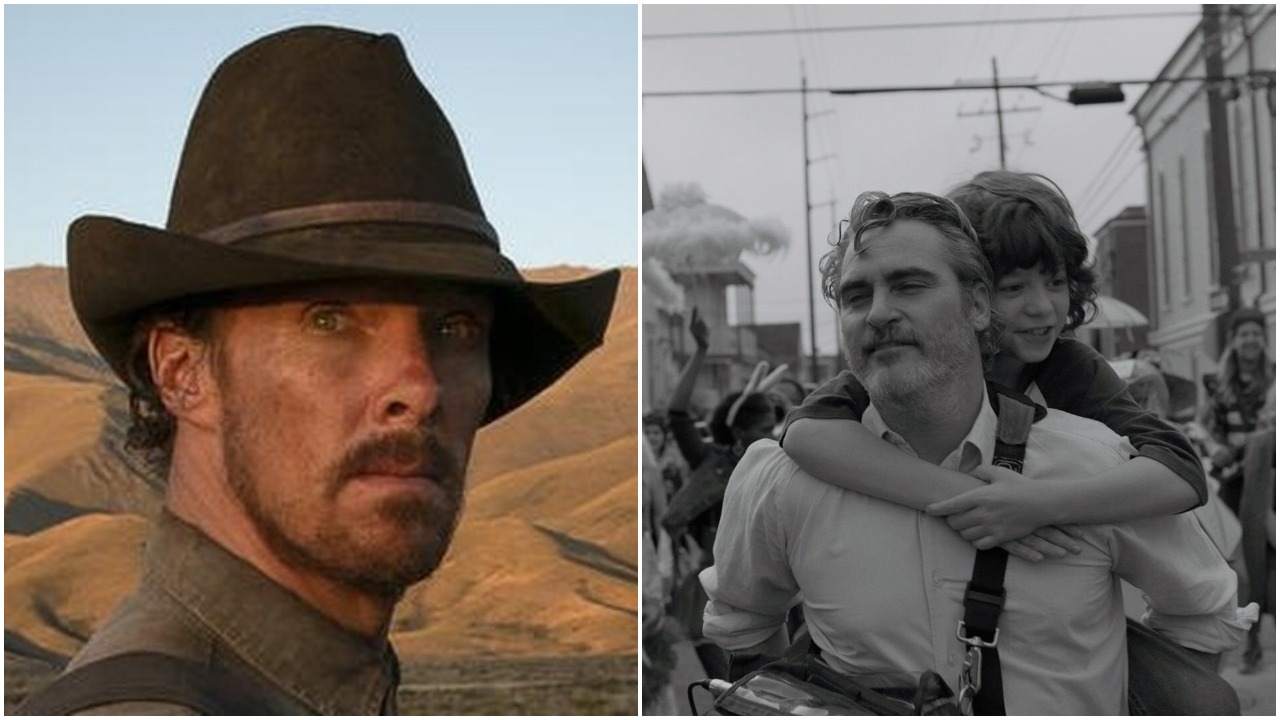When Benedict Cumberbatch staggers bowlegged into The Power of the Dog with one eye on Daniel Day Lewis’s Oscars, you have every right to expect the pinch-faced squinter to storm through Montana drinking everybody’s milkshake for the next two hours. But something feels off about his alpha lumbering, our first hint that Cumberbatch’s Phil Burbank is more enigmatic than he lets on.
Throughout her career, director Jane Campion has puzzled plenty over the allure of the brutish man and the idiosyncrasies concealed beneath his bristles, but Phil is a particularly baroque tangle of desires, evasions, and resentments. Similarly, the power struggle Campion leads us into is both subtler and crueler than it initially appears, a conflict over shifting affections that conceals who the real adversaries are and what stakes they’re playing for.
At the start of the film (based on Thomas Savage’s 1967 novel), two brothers return from the range, one lean and restless, one plump and sated. If Cumberbatch’s Phil is committed to a life beyond civilizing, for reasons that later become apparent, George (Jesse Plemons) already has one foot out of the stirrups. So when Rose, the pretty widder lady who runs the rooming house where the brothers bed, needs comforting (on account of Phil’s callousness, no less), George falls for her fast, the fact that she’s Kirsten Dunst being certainly no disincentive.
After a brief honeymoon, sketched quietly and warmly and quickly in a scene where the newlyweds fumble through a countryside two-step together, George and Rose set up house together. And the trouble begins. Spurred by his upwardly mobile need for social propriety, George inflicts a stuffy dinner party on Rose, insisting she entertain the guests on the ostentatiously fine piano he’s bought her. (As Sam Neill could tell George, no fellow in a Campion film should transport such an instrument into the sticks for the woman he loves.) Then there’s Phil, lurking mutely about and taunting Rose with the creepiest banjo plucking this side of Deliverance.
Rose has family too. Lisping, artistic, and gangly, her son Peter (Kodi Smit-McPhee) returns from boarding school announcing his plans to be a doctor, only to find buff, shirtless men cavorting about in his yard. An awkward foal on the range, he initially draws the mockery you’d expect from Phil and his men. But then Phil changes tack and sets about alienating Peter from his mother in the way Rose robbed Phil of his brother. Is Phil mentoring? Seducing? Endangering? Is there even a difference, and if so, does he know what it is?
Dunst, as reliable as any actor today, charts the path of Rose’s spiral into alcoholism as an overburdened woman retreating into the irresponsibility of girlhood. And Plemons, unknowingly wielding his kindness as a blunt weapon, is a maestro of obliviousness, his face capable of registering every shade of not-getting-it without ever changing expression. If we have to remake Bergman movies (we don't) I say the hell with the Isaac/Chastain Scenes from a Marriage—let’s skip straight to a Dunst/Plemons Shame.
As for Montana itself, that part is played beautifully (if not always convincingly) by Campion’s native New Zealand. As a backdrop it’s dappled with a complexity some of cinematography’s Malick-besotted newbs should study. But the landscape is also a character, dwarfing characters with its expanse to create a sense of gorgeous claustrophobia. Rarely has so much open space felt like such a trap.
For all that, the film belongs to Cumberbach and Smit-McPhee, who circle each other with a mix of predatory desire and mistrust. If I’m being a little cagey about where this leads, that’s because The Power of the Dog is a masterpiece of misdirection, with flurries of conflict drawing your attention while the real story takes shape in the periphery. The more you think you know what to expect from a Jane Campion film, the more it might surprise you.
C’mon C’mon may be the most perceptive movie about the life of a middle-aged single and childless uncle ever made, though I admit there isn’t a lot of competition. (I also admit I have a personal interest in the topic.) Mike Mills’ new film is a love story, though not a romantic one: It’s about the challenge of winning a child’s affection, of creating a relationship where none existed. And it’s about discovering that you earn that love through caring, and recognizing a child as a human rather than a means of validating yourself, which is a lesson that love stories of the more conventional rom-com variety could stand to learn.
Joaquin Phoenix is Johnny, who travels around the country creating instant connections with children as he interviews them about their ideas of the future. (We get to hear some of their real-life eloquence throughout the movie.) He’s estranged from his sister Viv (Gaby Hoffman) for reasons we can gather without the siblings really discussing them: the death of their mother, his role in her divorce from her bipolar husband (Scoot McNairy), Johnny’s typically male emotional inaccessibility. Johnny pops into L.A. just as Viv is about to go help her ex negotiate a manic episode in Oakland, so he’s left to watch her adorably weird nine-year-old son, Jesse (Woody Norman, whose cute little face is about 90% eyes).
Like any love story, Johnny’s courtship of Jesse begins sweetly. He teaches his nephew to use his recording equipment, and plays along with a gothy little game Jesse enjoys that involves him pretending to be an orphan. The interaction goes so well that when Johnny has an appointment in New York, he invites Jesse along—before asking the boy’s mom, which lets you know how much he knows about taking care of kids. Their trip out East is a dream, until it very much isn’t.
C’mon C’mon expresses a genuine faith in interpersonal communication without denying its difficulty. Unlike most movies about stunted men, C’mon C’mon doesn’t allow Johnny the luxury of isolated despondency or an unhappy ending. Circumstances force him to learn to relate to Jesse, and there’s even something of a fantasy quality to this dilemma: maybe every emotionally evasive individual wants to be found out like this, and only a kid would be tactless enough to demand the truth.
Norman isn’t immune from the Hollywood cutes (any cereal advertiser would pay good money to put a spoon in his hand), but he’s weird and lovable and frustrating in his own unique way. And damn is it refreshing to see Joaquin Phoenix play Just Some Guy for a change. Johnny isn’t homicidal or sexually malformed or a Roman emperor—just a little awkward, good at asking questions but not answering them about himself. Hoffman excels in the trickiest of the three roles, as a woman finding herself mothering two adult men while she’s away from the child she’d prefer to be caring for.
At times, C’mon C’mon can seem the visual equivalent of a slick podcast. The editing can lack friction, the ambient score (from the National’s Dessner bros) can be unambiently intrusive, and it’s hard not to be suspicious of anyone filming in black and white in 2021. But Mills’s directing style is an effective means of capturing how the characters’ eccentricities skirt the edge of quirk, and for extracting honest sentimentality from the lives of the slightly emotionally damaged. And that’s all of us, right?
The Power of the Dog and C'mon C'mon are now playing in local theaters.
Special Screenings This Week
Thursday, Dec. 2
The Personal History of David Copperfield (2019)
Capri Theater
Armando Iannucci—the guy behind Veep—takes on Dickens. $5/free for north Minneapolis residents. 7 p.m. More info here.
White Christmas (1954)
The Heights
The Heights’ annual White Christmas blitz is upon us. The film itself is preceded by a 20-minute performance by Maud Hixson and a Wurlitzer showcase. $18. 7:30 p.m. through Sunday. Also 2 p.m. on Saturday and Sunday. More info here.
Black Christmas (1974)
Parkway Theater
Like White Christmas, but more murdery. $9-$12. 8 p.m. More info here.
Devil’s Triangle (2021)
Trylon
It’s about time the Bermuda Triangle made a comeback, culturally. $8. 5 p.m. More info here.
Lineas de Sangre (2021)
Trylon
A dance film by choreographer Taja Will and filmmaker Sequoia Hauck. $20 advance/sliding scale $5-$50 at doors. 7 p.m. Also 5 p.m. Saturday. More info here.
Friday, Dec. 3
Sorry, Wrong Number (1948)
Trylon
Barbara Stanwyck month kicks off at the Trylon with this suspense classic. I’d be pretty freaked out if I heard people plan a murder over the phone too! $8. 7 & 9 p.m Friday and Saturday. 3 & 5 p.m. Sunday. More info here.
Saturday, Dec. 4
Gremlins (1984)
Alamo Drafthouse
Girl, are you a gremlin? Cause I wanna get you wet and multiply. $10. 6:30 p.m. More info here.
Euridice (Live)
AMC Rosedale 14/AMC Southdale 16/Showplace ICON
Opera, motherfuckers! $25. 11:55 a.m. Also 1 & 6:30 p.m. Wednesday. More info here.
The Muppet Christmas Carol (1992)
Parkway Theater
Needy puppets pester a holiday-averse businessman. $5-$10. 1 p.m. More info here.
Sunday, Dec. 5
Little Women (1994)
Alamo Drafthouse
They’re. So. Smol. $10. 11:25 a.m. More info here.
My Neighbor Totoro (1988)
AMC Eden Prairie 18/AMC Rosedale 14/AMC Southdale 16
Imagine taking your kid to see this in a theater. How hard would that rule? $13.44. 3 p.m. Also 7 p.m. Monday. More info here.
The Aviator’s Wife (1981)
Trylon
I bet you haven’t seen a lot of Eric Rohmer movies from the ’80s. The Trylon would like to change that this December. $8. 7 p.m. 7 & 9:15 p.m. Monday and Tuesday. More info here.
Monday, Dec. 6
The Night of the Hunter (1955)
The Heights
Run, kids! Robert Mitchum is after you! $12. 7:30 p.m. More info here.
Tuesday, Dec. 7
Elf (2003)
Alamo Drafthouse
Hide your cats! Everyone's favorite visitor from Melmac is back and—oh, sorry, it's Elf. $15. 6:30 p.m. More info here.
Wednesday, Dec. 8
In the Good Old Summertime (1949)
The Heights
A Christmas movie, no matter what the title says. In fact, a musical version of The Shop Around the Corner, with Judy Garland and Van Johnson. $12. 7:30 p.m .More info here.
Opening This Week
Benedetta
Can you believe that Paul Verhoeven’s never made a sexy lesbian nun movie before? You’ve got to admire his restraint.
Sword Art Online Progressive: Aria of a Starless Night
Virtual reality role-players are trapped inside a game in this anime you now know exactly as much about as I do.
Wolf
He was a wolf. She was a cat. Can I make it any more obvious?
Ongoing in Local Theaters
Clifford the Big Red Dog
Dune (read our review here)
Encanto
The French Dispatch (read our review here)
Ghostbusters: Afterlife (read our review here)
House of Gucci (read our review here)
King Richard
No Time to Die (read our review here)
Resident Evil: Welcome to Raccoon City






